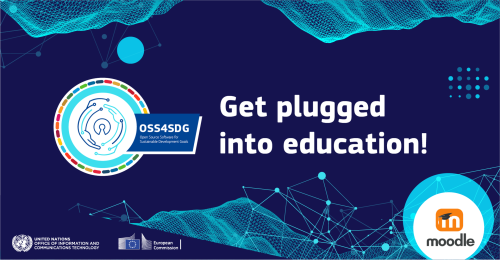Winners of the “Get plugged into Education!” Hackathon
The Office of Information and Communications Technology (OICT) and the European Commission Directorate-General for Informatics (EC DG--DIGIT) announced the five winners of the Get plugged into Education! hackathon, the first innovation event from the Open Source Software for Sustainable Development Goals (OSS4SDG) initiative, on 30 June.
 Prizes were awarded to the participants and teams that showed the most creativity in developing plugins to improve the Moodle mobile app and its video conferencing, as well any creative plugin to improve the LMS platform overall. Moodle is a free open source e-Learning platform platform designed to provide educators, administrators and learners with a single secure and integrated system to create personalized learning environments. Participants worked with Moodle mentors to establish concrete open source software solutions that can be re-used through open source licensing terms and conditions.
Prizes were awarded to the participants and teams that showed the most creativity in developing plugins to improve the Moodle mobile app and its video conferencing, as well any creative plugin to improve the LMS platform overall. Moodle is a free open source e-Learning platform platform designed to provide educators, administrators and learners with a single secure and integrated system to create personalized learning environments. Participants worked with Moodle mentors to establish concrete open source software solutions that can be re-used through open source licensing terms and conditions.
Winners included:
1st Prize—Mr. Essoh Lathe Gnagne Sebastien, Principal Inspector of Physics-Chemistry, Ministry of National Education and Technical Education, Government of Côte d'Ivoire. Mr. Sebastian’s solution integrates Moodle course groups into the Jitsi plugin, which allows teachers to create webconference activities fully integrated with Jitsi Meet—an open-source videoconferencing solution that enables you to easily build and implement secure video conferencing.
2nd Prize—RÉCIT FAD (Mr. Étienne Roy, Mr. Yvon Quémener, Mr. Émile Jacques, and Mr. Gustavo Bazzo). The RÉCIT FAD team, whose expertise is online training for information technologies in education, developed the Moodle HTML Bootstrap Editor plugin, which aims to create modern and engaging HTML content directly in Moodle.
3rd Prize—Ms. Marie-Eve Lévesque, Mr. Annouar Faraman and Mr. Andrew Caya, (University of Montreal, Canada). The aim of team’s plugin is to provide users with an overview of group events in the form of a table, where events are grouped by time (planning lab sessions, group meetings).
Honorable Mention—Mrs. Celine Perves (Digital Department, University of Strasbourg, France) Ms. Perves contributed with various plugins, in particular the ability to restore from remote sites.
Honorable Mention—Mr. Renaat Debleu (IT Specialist, eWallah). Mr. Debleu built a Moodle plugin for administrators to translate a full course using Neural Machine Engines.
The six-week competition (16 May – 13 June) was held virtually on the Unite Ideas platform. The hackathon received nearly 30 projects submitted from participants from all around the world, who showed their commitment, passion and talent for building solutions that can help those in more need.
About the “Open Source Software for Sustainable Development Goals (OSS4SDG)” joint initiative
To foster collaboration to tackle Sustainable Development Goals (SDGs) challenges with the help of open source software, the United Nations Office of Information and Communications Technology (OICT) together with the European Commission’s Directorate-General for Informatics (DG-DIGIT) are launching a series of innovation challenges in the framework of the “Open Source Software for Sustainable Development Goals (OSS4SDG)” initiative.
For each of the 17 SDGs, an innovation event will be held. Through these, participants will work with mentors to establish concrete solutions on different open source software platforms.

